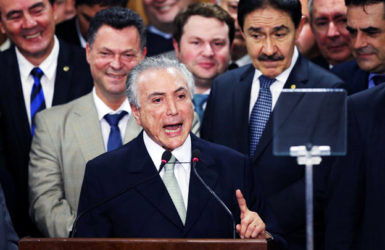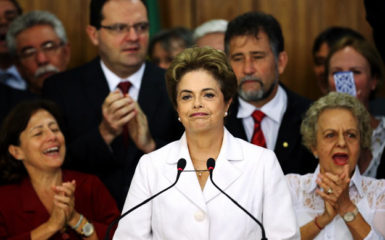BRASILIA, (Reuters) – Brazil’s interim President Michel Temer called on his country to rally behind his government of “national salvation,” hours after the Senate voted to suspend and put on trial his leftist predecessor, Dilma Rousseff, for breaking budget laws.
Temer, a 75-year-old centrist now moving to steer Latin America’s biggest country toward more market-friendly policies, told Brazilians to have “confidence” they would overcome an ongoing crisis sparked by a deep economic recession, political volatility and a sprawling corruption scandal.
“It is urgent we calm the nation and unite Brazil,” he said, after a signing ceremony for his incoming cabinet. “Political parties, leaders, organizations and the Brazilian people will cooperate to pull the country from this grave crisis.”

Brazil’s crisis brought a dramatic end to the 13-year rule of the Workers Party, which rode a wave of populist sentiment that swept South America starting around 2000 and enabled a generation of leftist leaders to leverage a boom in the region’s commodity exports to pursue ambitious and transformative social policies.
But like other leftist leaders across the region, Rousseff discovered that the party, after four consecutive terms, overstayed its welcome, especially as commodities prices plummeted and her increasingly unpopular government failed to sustain economic growth.
In addition to the downturn, Rousseff, in office since 2011, was hobbled by the corruption scandal and a political opposition determined to oust her.
After Rousseff’s suspension, Temer charged his new ministers with enacting business-friendly policies while maintaining the still-popular social programmes that were the hallmark of the Workers Party. In a sign of slimmer times, the cabinet has 23 ministers, a third fewer than Rousseff’s.
A constitutional scholar who spent decades in Brazil’s Congress, Temer faces the momentous challenge of hauling the world’s No. 9 economy out of its worst recession since the Great Depression and cutting bloated public spending.
He quickly named respected former central bank governor Henrique Meirelles as his finance minister, with a mandate to overhaul the costly pension system.
The Senate deliberated for 20 hours before voting 55-22 early yesterday to put Rousseff on trial over charges that she disguised the size of the budget deficit to make the economy look healthier in the runup to her 2014 re-election.
Rousseff, 68, was automatically suspended for the duration of the trial, which could be up to six months. Before departing the presidential palace in Brasilia, a defiant Rousseff vowed to fight the charges.
In her speech, she reiterated what she has maintained since impeachment proceedings were launched against her last December by the lower house of Congress. She denied any wrongdoing and called the impeachment “fraudulent” and “a coup.”
“I may have made mistakes but I did not commit any crime,” she said.

Rousseff’s mentor, former President Luiz Inacio Lula da Silva, who now faces corruption charges, stood behind her and looked on dejectedly. Even as outgoing ministers wept, Rousseff remained stolid.
“I never imagined that it would be necessary to fight once again against a coup in this country,” Rousseff said, in a reference to her youth fighting Brazil’s military dictatorship.
“This is a tragic hour for our country,” said Rousseff, an economist and former Marxist guerrilla, calling her suspension an effort by conservatives to roll back the social and economic gains made by Brazil’s working class.
The Workers Party rose from Brazil’s labour movement in the 1970s and helped topple generals who had held power for two decades ending in 1985.
In the heady days of Lula’s presidency, starting in 2003, it helped lift millions of people out of poverty before running into recession and scandal, with many of its leaders now tainted by corruption investigations and criminal convictions.
Despite Rousseff’s vows to fight, she is unlikely to be acquitted in the Senate trial. The size of the vote to try her showed the opposition already has the support it will need to reach the two-thirds majority required to remove her definitively from office.
“It is a bitter though necessary medicine,” opposition Senator Jose Serra, who became the new foreign minister, said during the marathon Senate debate. “Having the Rousseff government continue would be a bigger tragedy.”
Temer aides said the incoming government would soon announce a series of austerity measures to help reduce a massive budget deficit. An immediate goal is a reform of Brazil’s costly pension system, possibly setting a minimum age for retirement, said one advisor.
Brazilian markets, which for weeks have rallied because of expectations for a business-friendly Temer administration, traded similarly to a day earlier.
Upon being notified of her suspension early yesterday, Rousseff dismissed her cabinet, including the sports minister, who is in final preparations for the Olympics in Rio de Janeiro in August. The central bank governor, who has ministerial rank, was the only minister to remain.
As suspended head of state, Rousseff can continue to live in her official residence, and is entitled to a staff and use of an Air Force plane.
Fireworks erupted in cities across Brazil after the Senate vote, but the country took the change in stride. Some celebrants in São Paulo and other cities draped themselves in Brazil’s green, yellow and blue flag, while some Rousseff backers protested.
Temer, of the grab-bag Brazilian Democratic Movement Party, must stabilize the economy and restore calm at a time when Brazilians, increasingly polarized, are questioning whether their institutions can deliver on his promise of stability.
In addition to the gaping deficit, equal to more than 10 percent of its annual economic output, Brazil is suffering from rising unemployment, plummeting investment and a projected economic contraction of more than 3 percent this year.
“Only major reforms can keep Brazil from moving from crisis to crisis,” says Eduardo Giannetti da Fonseca, an economist and author in São Paulo who has written extensively about the country’s socioeconomic problems.
But those changes, including the pension effort, overhauls of tax and labor laws and a political reform to streamline fragmented parties in a mercenary Congress, could remain elusive at a time of turmoil.
Elected leaders from parties that had been in the opposition expressed optimism yesterday that they could come together to help spur a recovery. Even some leftists said Temer may enjoy Congressional goodwill because, after his long experience there, he could ably negotiate with disparate parties and interests.




